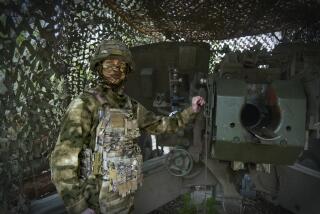Primakov Does U-Turn Over Atlantic, Heads Home
MOSCOW — Russian Prime Minister Yevgeny M. Primakov, on his way to Washington in the hope of winning billions of dollars in aid, turned around over the Atlantic and returned home Tuesday after it became apparent that NATO airstrikes against Yugoslavia were imminent.
Earlier in the day, Primakov denied that Russia had violated an international arms embargo against Yugoslavia by attempting to ship MIG-21 fighter planes to its Slavic ally when an assault by the North Atlantic Treaty Organization appeared in the cards.
Primakov, who has consistently opposed any NATO attack on Yugoslavia to halt the conflict in the rebellious Kosovo region, talked to Vice President Al Gore from the air and sought assurances that there would be no bombing while he was in Washington for meetings with President Clinton, Gore and the International Monetary Fund. With airstrikes apparently near, the two agreed to postpone the meetings until a later date.
“After discussing the worsening situation in Kosovo, Prime Minister Primakov decided to return to Moscow,” Gore said after their telephone conversation.
With his abrupt return to Moscow, Primakov missed a rare opportunity to appeal directly to top U.S. leaders for financial help. His 6-month-old government has pinned its hopes for stabilizing Russia’s beleaguered economy on further multibillion-dollar loans from the IMF and other foreign lenders.
Any NATO bombing of Yugoslavia and the postponement of the Washington talks are certain to further strain U.S.-Russian relations, already tense because of disagreements over NATO’s eastward expansion and the Clinton administration’s commitment to a space-based missile defense system.
In Russia, where sentiment in support of Yugoslavia is strong, Primakov’s refusal to meet with the Americans is sure to boost his political standing.
“Primakov is returning home a far stronger leader than when he left,” said Victor A. Kremenyuk, deputy director of the U.S.A.-Canada Institute, a Moscow think tank.
Primakov’s U-turn over the Atlantic could even signal that Russia is prepared to come to Yugoslavia’s aid with military assistance, Kremenyuk said.
“Primakov demonstrated that Russia is being extremely serious in its refusal to accept NATO airstrikes, that Russia will withdraw from the sanctions regime [against Yugoslavia] and that Russia will deliver military aid to Yugoslavia,” he said.
Earlier Tuesday, controversy erupted when Azerbaijan, a former Soviet republic, revealed its detention of a giant Russian cargo plane carrying six MIG-21 jet fighters and charged that the warplanes were headed for Yugoslavia.
The Ruslan cargo plane had stopped in Baku, the Azerbaijani capital, to refuel Friday when customs officials found it was carrying disassembled fighter planes, not the industrial cargo listed on its manifest.
“We have detained a Russian Ruslan cargo plane which is carrying six jet fighters to Yugoslavia,” Vafa Guluzade, foreign policy advisor to Azerbaijani President Heydar A. Aliyev, told Reuters.
In Moscow, the Russian Foreign Ministry denied that the fighter planes were headed for Yugoslavia and called on Azerbaijan to release them. Foreign Ministry spokesman Vladimir Rakhmanin said the jets belong to Kazakhstan and were on their way to Slovakia. Primakov, questioned about the fighter plane delivery during a brief stopover in Ireland before he turned back, denied that Russia had broken the arms embargo against Yugoslavia--at least so far.
Russia “has not yet lifted sanctions against Yugoslavia in what concerns arms supplies to this country,” Primakov said, according to Itar-Tass news agency.
The journey of the Russian cargo plane as it flew from one ex-Soviet republic to another remains murky. Where the plane and its cargo originated is unclear, but it apparently flew from Kazakhstan to Baku on Friday.
Azerbaijani border guards and customs inspectors first became suspicious when they saw that the plane’s documents showed it was headed to North Korea--4,000 miles in the opposite direction. Another document indicated that its destination was the Czech Republic, while a third paper showed it was supposed to go to Slovakia. Some members of the crew indicated that the cargo was actually intended for Yugoslavia, Azerbaijani officials said.
The Russian-owned cargo plane was carrying 34 people, many of them Russian and including engineers and pilots. Fourteen of them did not have documents allowing them to travel abroad, Azerbaijani officials said.
In Kazakhstan, presidential press service chief Lev Y. Tarakov said his country has not violated the arms embargo against Yugoslavia. Kazakhstan will conduct its own inquiry into the shipment of warplanes, he said.
“It is not clear at all now what country these MIGs belong to and whose citizens the accompanying personnel are either. It may well be a Russian plane carrying Russian fighters somewhere,” Tarakov said.
After holding the plane for five days, Azerbaijan’s decision to go public Tuesday may have been aimed at embarrassing Primakov as he was set to arrive in Washington.
Azerbaijan is angry at Russia for supplying what it contends is $1 billion worth of arms to Armenia, another former Soviet republic. The two neighbors have been engaged in a 10-year territorial dispute that has claimed thousands of lives.
*
Sergei L. Loiko of The Times’ Moscow Bureau contributed to this report.
More to Read
Sign up for Essential California
The most important California stories and recommendations in your inbox every morning.
You may occasionally receive promotional content from the Los Angeles Times.










